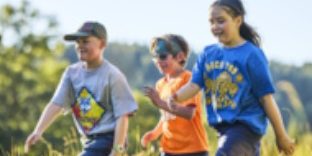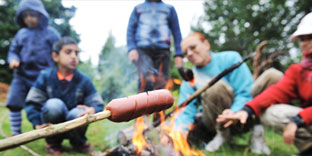Providing A Compass For Life
For almost 100 years, Scouting programs have instilled in youth the values found in the Scout Oath and Scout Law. Today, these values are just as relevant in helping youth grow to their full potential as they were in 1910. Scouting helps youth develop academic skills, self-confidence, ethics, leadership skills, and citizenship skills that influence their adult lives. The Boy Scouts of America provides youth with programs and activities that allow them to
• Try new things.
• Provide service to others.
• Build self-confidence.
• Reinforce ethical standards.
While various activities and youth groups teach basic skills and promote teamwork, Scouting goes beyond that and encourages youth to achieve a deeper appreciation for service to others in their community.
Scouting provides youth with a sense that they are important as individuals. It is communicated to them that those in the Scouting family care about what happens to them, regardless of whether a game is won or lost.
Finally, and perhaps most importantly, Scouting promotes activities that lead to personal responsibility and high self-esteem. As a result, when hard decisions have to be made, peer pressure can be resisted and the right choices can be made.
Safety
The safety of your child while involved in any Scouting activity is the unit leader’s number one priority. For this reason, the BSA has created safety policies and procedures, and established age-appropriate guidelines for all Scouting activities.
Types Of Outdoor Activities
What are typical outdoor Scouting activities?
Camping — Learn to live in the outdoors. Camping takes you on exciting adventures into the natural world.
Camporees — Councils and districts plan camporees and other outings during the year that give Scouts an opportunity to test their knowledge and skills in competitive events with other troops and patrols.
Council High Adventure — A high-adventure experience includes at least five nights and six days of trekking in wilderness and other rugged, remote locations. Trekking may include backpacking, canoeing, mountain biking, horse packing, mountain climbing, ski touring, rafting, kayaking, and a host of other outdoor adventures.
Cub Scout Derbies — Race a model car, sailboat, or miniature rocket in a Cub Scout derby—the pinewood derby, raingutter regatta, or space derby.
Day Hikes — Reasonably short hikes (3 to 10 miles) in terrain without a lot of elevation gain or loss.
Jamborees — Every four or five years, the Boy Scouts of America hosts a national Scout jamboree. More than 40,000 Scouts and leaders from across the country participate in this 10-day event filled with the most popular and highest quality outdoor activities Scouts enjoy.
National High Adventure — The BSA operates national high-adventure bases and programs. With two locations in the Florida Keys, the Florida National High Adventure Sea Base offers a variety of aquatic and boating programs. The Northern Tier National High Adventure Program, based in northern Minnesota with two satellite bases in Canada, provides a variety of canoe treks and programs. Philmont Scout Ranch in the mountains of New Mexico provide excellent backpacking treks. Summit Bechtel Reserve provides white water rafting, hiking, mountain biking, climbing, zip lines, and many other high adventure opportunities.
Patrol Activities — A Scouts BSA patrol may hike or camp with other patrols or squads in the unit or, with the permission of the Scoutmaster and parents or guardians, the patrol may hike or camp on its own.
Service Projects — Doing service projects is one way for Scouts to keep their promise “to help other people.” These daylong projects may be related to conservation, food collection, building shelter, or healthy living activities.
Summer Camp — Summer camp is what many Scouts enjoy most. Camp programs provide numerous opportunities for Scouts to earn merit badges along their advancement trail. Resident Scout camping includes at least five nights and six days of fun outdoor activities.
Unit High Adventure — The highest level of challenge for a troop or team is to plan and carry out its own high-adventure experience. These activities for more experienced Scouts are planned and implemented by youth members with coaching from their adult leaders.
Weekend Overnights — Troops that plan and carry out outings once a month attract and retain Scouts at a much higher level than those that have fewer outings during the year.
Benefits
When you join the Boy Scouts of America, Scouting is like an extension of your family: It follows your values, it sees to the overall care and well-being of your child, and it’s always there for you. It’s not an either/or choice you have to make for your child. It works with you to let you manage your time and other activities and will always be there when you return.
Maturity. Youth experience dramatic physical and emotional growth. Scouting offers them opportunities to channel much of that change into productive endeavors. Through service projects and Good Turns, Scouts can discover their place in the community. Many Scouting activities allow youth to associate with others from different backgrounds. The religious emblems program offers pathways for Scouts to more deeply understand their duty to God. The unit provides each Scout with an opportunity to explore, to try out new ideas, and to embark on adventures that sometimes have no design other than to have a good time with good people.
Flexibility. The Scouting programs are flexible and accommodate the need to balance the work and life requirements of a busy family. It’s easy to plan for meetings and activities, and if something unexpected comes up, just let your leader know — it’s expected in the lives we live today.
Adaptability. Your child can work on achievements at his or her own pace. For example, if your child is in a spring soccer league and has to miss several meetings and activities, he or she still can complete and sign off on Scout activities to work toward the next level.
Transferability. The skills and values your child learns through Scouting can be applied in any non-Scouting activity he or she participates in. As your child builds character, this can be an especially valuable defense to the peer pressure all youth experience when growing up.



 Join Today!
Join Today!
 Events Calendar
Events Calendar
 Resource Center
Resource Center
 News Room
News Room
 Things To Do
Things To Do
 Give Now
Give Now